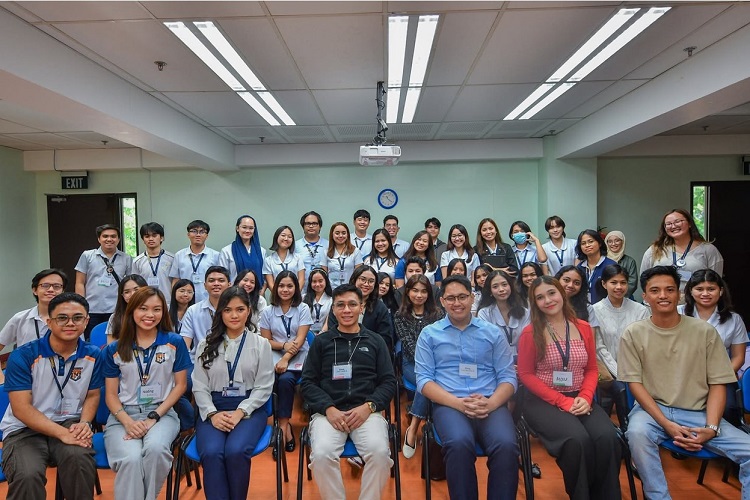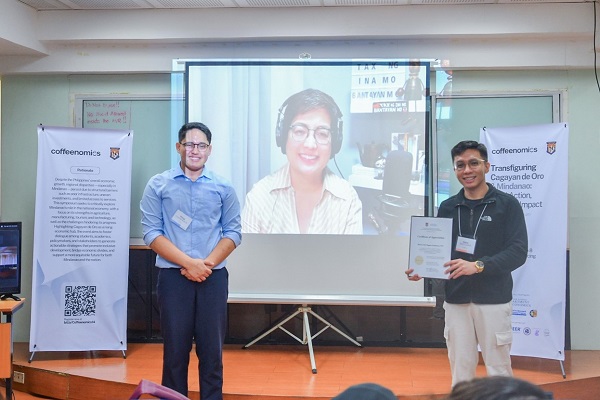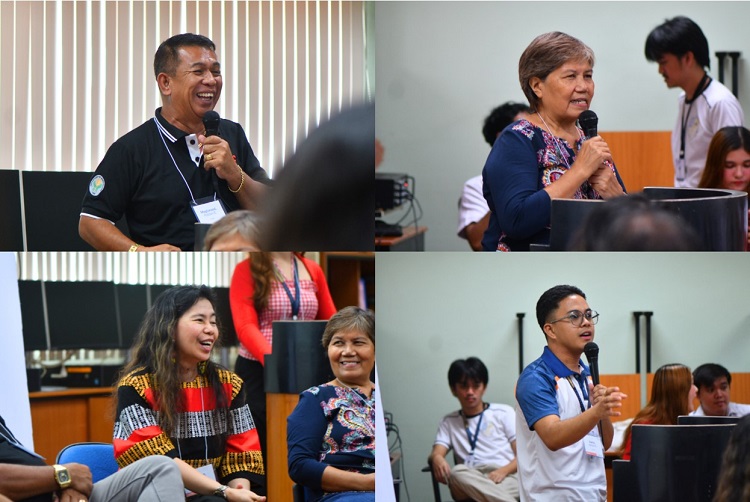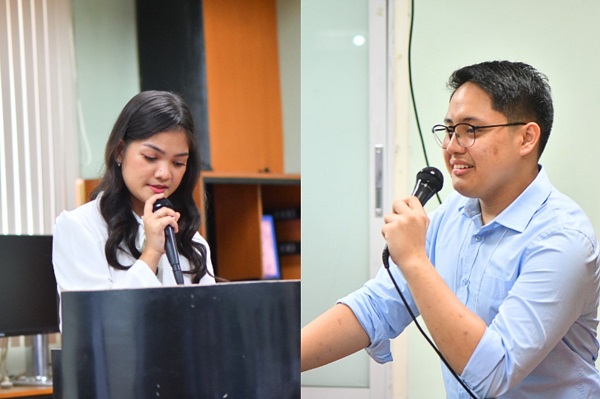By Matthew Valmores Roa
AB Economics 1

The Xavier University Economics Society, in partnership with the Xavier University Department of Economics and the Xavier University Social Development Cluster (through the Social Involvement and Advocacy Program or SIAP), kicks off the 14th Coffeenomics Series anchored on the theme, “Transfiguring Cagayan de Oro and Mindanao: Local Action, Regional Impact.” This year’s edition served as a dynamic platform for multisectoral dialogue on timely and urgent national and local economic concerns, engaging stakeholders from the academe, agriculture, environment & youth sectors, and civil society.
The lecture-symposium was led by Nicholai Wong (Project Head), and took place on 15 April 2025, at the Xavier University SBM AVR 8, with a wider audience joining the event via Zoom Teleconferencing. The event began with an opening remark delivered by Fr Frank Dennis B Savadera SJ, DMin – Xavier University’s Vice President for Mission and Ministry. This was followed by a well-rounded lineup of resource speakers and panelists, all of whom contributed critical insights on the state of the economy at both national and local contexts.

Vice President for Mission & Ministry, Fr Frank Dennis B Savadera SJ delivers the opening remarks (Left); and
NEDA Region X OIC-Regional Director Richardson T Cua delivers the Keynote Address via Zoom –
Screengrab from Author (Right)
The keynote address was delivered by OIC-Regional Director Richardson T Cua, MA, EnP, from the National Economic and Development Authority (NEDA) Region X, where he emphasized the crucial role of Regional Development Councils as conduits for inclusive growth. Mr Cua also spotlighted Northern Mindanao (Region 10) as a key strategic player in the national development framework, citing its status as an Agricultural Industry Center and as the fourth metropolitan hub in the Philippines. With the region’s poverty rate currently at 18.4%, he presented a vision to reduce this figure to 10–12% by 2028 through local investment programs and participatory planning. Infrastructure projects such as the Mindanao Container Terminal expansion and the Laguindingan Airport upgrade were cited as evidence of the national government’s commitment to boosting regional capacity and connectivity.

Dr Cielo Magno-Gatmaytan joins for a hybrid photo opportunity via Zoom. She is joined by Xavier University
Economics Department Chairperson Jhon Louie B Sabal, MA (Right) and 14th Coffeenomics Project Head
Nicholai Wong (Left).
The highlight of the morning session – the national situationer, was delivered by Cielo Magno-Gatmaytan, PhD, Associate Professor at the University of the Philippines School of Economics and former Undersecretary of the Department of Finance. During her presentation, Dr Magno turned to fiscal policy and national priorities, providing a sharp and critical overview of the country’s current economic landscape. She highlighted the Philippines’ ₱16.31 trillion debt as of January 2025, pointing to the need for responsible borrowing and improved tax effort, particularly through enhanced industry contributions and reduction of leakages in the system. She raised concerns over disproportionate budget allocations—such as the higher budget given to the Department of Public Works and Highways (DPWH) compared to the Department of Education—and the declining funding for education and healthcare in favor of patronage-based programs. Her call to action underscored the urgency for transparent governance, stronger public participation, and the inclusion of academia in shaping and evaluating public policy.
To complement the morning session, the afternoon’s local situationer was delivered by Jhon Louie B Sabal, MA, PhD (Cand.) – Chairperson of the Xavier University Department of Economics and pioneering organizer of the Coffeenomics series. Mr Sabal offered a grounded analysis of Cagayan de Oro and Northern Mindanao’s economic performance. Despite a national growth average of 4.9%, Mindanao remains heavily reliant on private consumption and the service sector, with Luzon accounting for nearly 70% of the country's GDP. He highlighted that Cagayan de Oro’s economy is largely dependent on wholesale and retail trade, with micro-enterprises still comprising the majority of local businesses. He pointed out persistent inequalities in budget distribution, energy costs, and employment opportunities, and emphasized the necessity of localized planning that reflects the region's realities and untapped strengths.

Roldan Maglunsod of the Regional Agri-Fishery Council (Top-left); Donna Echalico of the Kinaiyaha Coalition (Top-right); Lordilie Enjambre of the
Mindanao Development Authority (Bottom-left); and Joshua Juarez of the Xavier University Economics Society (Bottom-right)
The lecture-symposium also featured a Public Roundtable Discussion, bringing together key local stakeholders, including Roldan Maglunsod of the Regional Agri-Fishery Council; Donna Echalico, Secretariat Head of the Kinaiyahan Coalition; Lordilie Enjambre, Northern Mindanao Area Head of the Mindanao Development Authority (MinDA); and Joshua Juarez, Vice President of the Xavier University Economics Society.
The roundtable drew attention to the economic sector most often left behind—agriculture. Roldan Maglunsod issued a dire warning: “Agriculture is dying.” He cited decreasing numbers of farmers and fisherfolk, systemic flaws in incentive distribution, and insufficient government support as major contributors to the sector’s decline. Adding another dimension to the conversation, Donna Echalico expanded the discussion to include environmental stewardship. She underscored the intrinsic links between agriculture, environmental sustainability, and economic resilience, urging both citizens and urban planners to adopt a more proactive and conscientious approach to development and conservation efforts.
Lordilie Enjambre of MinDA emphasized the untapped potential of agriculture, particularly within Indigenous Peoples (IP) communities. She advocated for value-adding innovations—such as bamboo-based products—as viable and sustainable economic alternatives. And representing the student body, Mr Joshua Juarez highlighted the vital role of youth in tackling structural challenges not only in agriculture but also across other key sectors. He encouraged students to cultivate greater awareness and take an active role in shaping national economic policy, particularly by engaging with sectoral issues at the grassroots level.

Jessica Cahulogan of the Xavier University Economics Department (Left);
and Nicholai Wong, 14th Coffeenomics Project Head (Right)
To bring the event to a thoughtful close, Jessica Cahulogan of the Economics Department synthesized the entire discourse, drawing together the diverse perspectives shared throughout the symposium. Nicholai Wong (Project Head) then delivered his closing remarks, expressing heartfelt gratitude to the members of the Xavier University Economics Department and Economics Society for their contribution and dedication in making the event a success. He concluded by looking ahead with optimism to the 15th Coffeenomics series next year.
As the 14th Coffeenomics drew to a close, what lingered was not just the aroma of coffee, but the profound exchange of insights, reflections, and urgent calls to action. This year’s symposium reaffirmed a powerful truth: [that] economic discourse must not remain confined to policy rooms or academic circles—it must be grounded in the lived realities of ordinary citizens. From farmers to students, and policymakers to professors, everyone has a stake in building a more inclusive and resilient Mindanao.
Coffeenomics is more than just an annual academic gathering—it is a brewing ground for bold ideas, a space where conversation becomes a catalyst for transformation. As economic challenges persist and evolve, platforms like these ensure that the dialogue continues—and that from the grind of problems, real solutions are brewed.